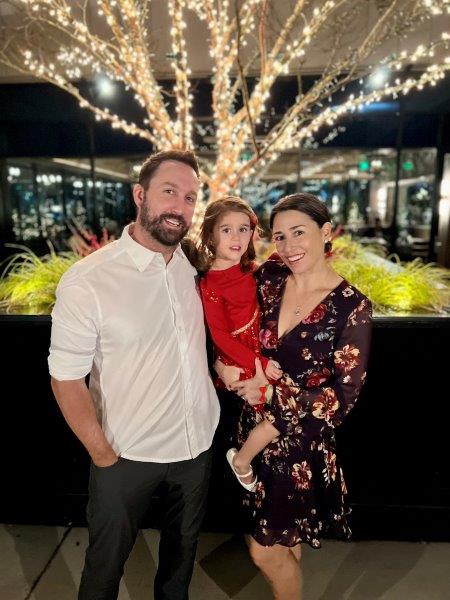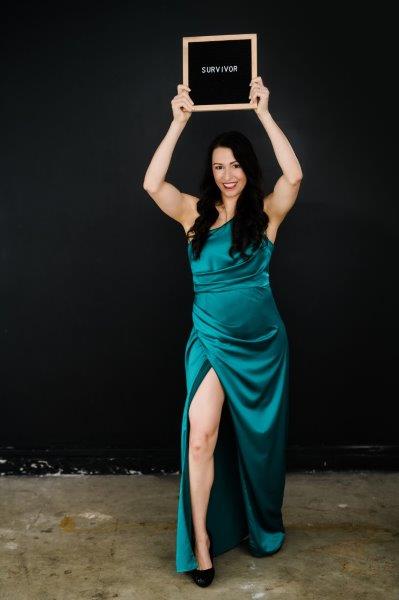

July 2023
I was diagnosed with stage 3 ovarian cancer in August 2021, two years after I gave birth to my daughter and one month after my 40th birthday. A few months after giving birth, I started experiencing unusual discomfort in my lower abdomen. However, the doctor attributed it to my body adjusting post-childbirth. Unaware of ovarian cancer and its symptoms at the time, I now wish I had insisted on an ultrasound. Fast forward a year and a half later, I could barely leave my bed to attend my friend’s bachelorette dinner due to severe lower abdomen pain. The following night, the excruciating stomach pain made it difficult to sleep. I felt like I was going to throw up or have a bad bowel movement. Eventually, I was able to sleep a couple hours and upon awaking, the pain persisted. That’s when I knew something was wrong, and I scheduled an appointment with my doctor the same day, leading to an ultrasound and blood work.
The ultrasound revealed two melon-sized cysts on my ovaries, prompting discussions with my OB-GYN team about laparoscopic surgery to remove them. During a prep call with the doctor I said, “This seems so weird, are we sure there is nothing else going on?” She responded, “let’s get another blood draw and get a CT just so I really know what I am dealing with when I cut you open.” Cancer had still not crossed my mind.
Little did I know I was getting a CA-125 blood test. The result came back with a CA-125 of 174 and the CT indicated possible malignancy in the two tumors. The doctor called me to share the news, leaving me in shock. Five days later, I met with a gynecologic oncologist. I am grateful that my care team acted quickly, getting me to a specialist within three weeks of symptoms appearing.
My oncologist informed me that we wouldn’t know the exact nature of my tumors until surgery. At the time, my husband and I were trying to have another child, and I expressed my desire to preserve my fertility if it was deemed safe. The thought of losing my ability to conceive was devastating, and I experienced regret for not freezing my eggs when my OB-GYN recommended it in my early 30s. I still struggle with these emotions.
The day of my surgery, I was still holding on to the hope it was not cancer. The procedure went well, and upon regaining consciousness, my first question was whether they were able to save any portion of my ovaries. A quick biopsy performed while I was under anesthesia yielded inconclusive results, so the doctor saved half an ovary, my uterus, and cervix. I was SO relieved. My doctor gave me a heads up that a more detailed pathology report would be ready in about a week which would give us official results.
A week later I got an alert on my phone. My test results were ready and sent directly to me. Anticipating positive news, I started reading the report, only to come across the term “high grade serous carcinoma” mentioned in all the biopsy results. I wasn’t sure what that meant, but I knew it wasn’t good. I made the mistake of Googling it, and everything said, “an aggressive form of ovarian cancer,” “poor survival rates,” and “no cure.” I burst into tears and started thinking, “Does this mean I am going to die?!” I was afraid I would not see my daughter grow up.
When I saw my oncologist, he informed me it was stage 3b. We discussed a plan and just a week after being diagnosed, I started chemotherapy of Carboplatin/Taxol. It was so overwhelming. One of my biggest fears about chemo was losing my hair. My oncologist recommended a cold cap, and fortunately I was able to get it in time for treatment.
Simultaneously, I assembled my team consisting of my oncologist, a holistic oncologist specializing in mistletoe therapy, a Chinese herbalist, an acupuncturist, a yoga and meditation instructor, and therapists to help me navigate my emotions. I consider myself fortunate to have the resources to pursue an integrative approach. One of my doctors emphasized the importance of taking ownership of my health and being the “CEO of my health.” While my team provides advice, information, and recommendations, I conducted research and made the final decisions regarding my treatment. It was great advice. Stress reduction became a focal point, prompting me to incorporate activities that activate my parasympathetic nervous system, such as breathing exercises, meditation, acupuncture, and infrared sauna sessions. Exercise played an important role as well.
By adjusting my diet and incorporating intermittent fasting, I managed to tolerate chemotherapy better than expected. Prior to and after each session, I abstained from heavy foods like animal protein and carbohydrates, opting for bone broth soups and increased vegetable consumption. During the first week after each cycle, I felt exhausted, but with my family’s support, I could prioritize rest and sleep. Overall, I believe that adopting a healthier diet and utilizing herbal supplements played a role in my ability to handle treatment relatively well.
I finished my last chemo on December 17, 2021. It was an emotional day thinking about how far I had come in the past three months. My CA-125 had dropped significantly and was within the normal range. From feeling hopeless upon the initial diagnosis, I gained hope from educating myself about my cancer, reading about new drugs, connecting with support systems, and meeting fellow survivors.
My consultation with my fertility doctor confirmed that I no longer had any viable eggs, I scheduled my complete hysterectomy for March 2022. This procedure also presented an opportunity for a second look and additional biopsies. While most sites were cancer-free, few areas showed microscopic levels of cancer, which was disheartening. The thought of starting chemotherapy less than five months after completing it was inconceivable and daunting. My body had barely begun to regain its strength.
After consulting with my team, I decided to rest my body and start Avastin. However, less than a month after my surgery, I ended up in the ER with an appendix issue. It was frustrating, but fortunately, I was able to receive antibiotics instead of undergoing surgery. After that episode, we switched from Avastin to Zejula. Even though I am not BRCA or HRD, we remained hopeful this treatment would work.
The rest of 2022 my CA-125 levels remained stable, and my CT scans showed no signs of cancer. In December of 2022, my CA-125 levels spiked slightly within the normal range. After a pelvic exam in March 2023, my doctor recommended a CT scan, and the results came back clear. In April, we decided to combine Avastin with Zejula since my CA-125 levels had been gradually increasing with fluctuations. If the numbers continue to rise in the next couple months, I will get another scan.
Cancer turned my world upside down, and I am aware that my life may never return to its previous pace. In hindsight, I am confident the stress in my life impacted health. Currently, I’m trying to define what my life should look like now that I am managing this disease.
Survivors have advised me that the cancer journey is a marathon, not a sprint. I know there will be ups and downs, and some days I might feel down, sad, or the need to cry…and that is okay. Ultimately, I believe there is hope. I am prepared to possibly have some degree of cancer for the rest of my life. I continue to have hope in medical advancements and treatments that might transform cancer into a chronic disease, allowing me to travel with my family, witness my daughter’s growth, and possibly expand our family. Every day I am thankful that I am alive.

